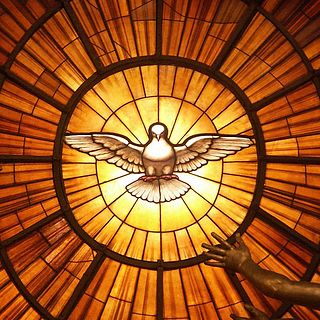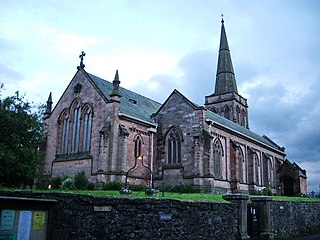Related Research Articles
Speaking in tongues, also known as glossolalia, is an activity or practice in which people utter words or speech-like sounds, often thought by believers to be languages unknown to the speaker. One definition used by linguists is the fluid vocalizing of speech-like syllables that lack any readily comprehensible meaning. In some cases, as part of religious practice, some believe it to be a divine language unknown to the speaker. Glossolalia is practiced in Pentecostal and charismatic Christianity, as well as in other religions.
Pentecostalism or classical Pentecostalism is a Protestant Charismatic Christian movement that emphasizes direct personal experience of God through baptism with the Holy Spirit. The term Pentecostal is derived from Pentecost, an event that commemorates the descent of the Holy Spirit upon the Apostles and other followers of Jesus Christ while they were in Jerusalem celebrating the Feast of Weeks, as described in the Acts of the Apostles.

The Church of God, with headquarters in Cleveland, Tennessee, United States, is an international Holiness-Pentecostal Christian denomination. The Church of God's publishing house is Pathway Press.
The Holiness movement is a Christian movement that emerged chiefly within 19th-century Methodism, and to a lesser extent influenced other traditions such as Quakerism, Anabaptism, and Restorationism. Churches aligned with the holiness movement teach that the life of a born again Christian should be free of sin. The movement is historically distinguished by its emphasis on the doctrine of a second work of grace, which is called entire sanctification or Christian perfection. The word Holiness refers specifically to this belief in entire sanctification as an instantaneous, definite second work of grace, in which original sin is cleansed, the heart is made perfect in love, and the believer is empowered to serve God. For the Holiness movement, "the term 'perfection' signifies completeness of Christian character; its freedom from all sin, and possession of all the graces of the Spirit, complete in kind." A number of Christian denominations, parachurch organizations, and movements emphasize those Holiness beliefs as central doctrine.
Oneness Pentecostalism is a nontrinitarian religious movement within the Protestant Christian family of churches known as Pentecostalism. It derives its name from its teaching on the Godhead, a form of Modalistic Monarchianism commonly referred to as the Oneness doctrine. The doctrine states that there is one God―a singular divine spirit with no distinction of persons―who manifests himself in many ways, including as Father, Son, and Holy Spirit. This stands in sharp contrast to the mainstream doctrine of three distinct, eternal persons posited by Trinitarian theology.
The charismatic movement in Christianity is a movement within established or mainstream Christian denominations to adopt beliefs and practices of Charismatic Christianity, with an emphasis on baptism with the Holy Spirit, and the use of spiritual gifts (charismata). It has affected most denominations in the United States, and has spread widely across the world.
In Christian theology, baptism with the Holy Spirit, also called baptism in the Holy Spirit or baptism in the Holy Ghost, has been interpreted by different Christian denominations and traditions in a variety of ways due to differences in the doctrines of salvation and ecclesiology. It is frequently associated with incorporation into the Christian Church, the bestowal of spiritual gifts, and empowerment for Christian ministry. Spirit baptism has been variously defined as part of the sacraments of initiation into the church, as being synonymous with regeneration, or as being synonymous with Christian perfection. The term baptism with the Holy Spirit originates in the New Testament, and all Christian traditions accept it as a theological concept.
Signs and wonders refers to experiences that are perceived to be miraculous as being normative in the modern Christian experience, and is a phrase associated with groups that are a part of modern charismatic movements and Pentecostalism. This phrase is seen multiple times throughout the Bible to describe the activities of the early church, and is historically recorded as continuing, at least in practice, since the time of Christ. The phrase is primarily derived from Old and New Testament references and is now used in the Christian and mainstream press and in scholarly religious discourse to communicate a strong emphasis on recognizing perceived manifestations of the Holy Spirit in the contemporary lives of Christian believers. It also communicates a focus on the expectation that divine action would be experienced in the individual and corporate life of the modern Christian church, and a further insistence that followers actively seek the "gifts of the Spirit".
Harold Vinson Synan was an American historian, author, and alliance leader within the Pentecostal movement. Synan published a total of 25 books, a majority related to Holiness, Pentecostal, and Charismatic movements. He served as General Secretary of the International Pentecostal Holiness Church and later as Chair of the North American Renewal Service Committee from 1985 to 2001. From 1994 - 2006 he served as Dean of the School of Divinity at Regent University in Virginia Beach, Virginia. In 2016, Synan moved back to Tulsa, Oklahoma, to re-join the faculty of Oral Roberts University as Interim Dean of the College of Theology and Ministry, where he served for two years. Following that he served as Scholar in Residence at Oral Roberts University where he worked closely with William M. Wilson, the president of ORU, the World Pentecostal Fellowship, and Empowered21.

The Catholic Charismatic Renewal (CCR) is a movement within the Catholic Church that is part of the wider charismatic movement across historic Christian churches.

Within many denominations of Christianity, Christian perfection is the theological concept of the process or the event of achieving spiritual maturity or perfection. The ultimate goal of this process is union with God characterized by pure love of God and other people as well as personal holiness or sanctification. Other terms used for this or similar concepts include entire sanctification, holiness, perfect love, the baptism with the Holy Spirit, the indwelling of the Holy Spirit, baptism by fire, the second blessing, and the second work of grace.

The Higher Life movement, also known as deeper Christian life, the Keswick movement or Keswickianism, is a Protestant theological tradition within evangelical Christianity that espouses a distinct teaching on the doctrine of entire sanctification.
David Johannes du Plessis was a South African-born American Pentecostal minister. He is considered one of the main founders of the charismatic movement, in which the Pentecostal experience of baptism with the Holy Spirit spread to non-Pentecostal churches worldwide.
Renewal is the collective term for Charismatic, Pentecostal, and Neo-charismatic churches. According to the World Christian Database, there are nearly 80 million renewalists in the United States, including pentecostals, charismatics and neo-charismatics.
Gilbert Earl Patterson was an American Holiness Pentecostal leader and pastor who served as the founding pastor of the Temple of Deliverance COGIC Cathedral of Bountiful Blessings, one of the largest COGIC Churches in the Eastern United States, from 1975 to 2007. He also served as the Presiding Bishop the Church of God in Christ (COGIC), Incorporated, a 6 million-member Holiness Pentecostal denomination, that has now grown to become one of the largest predominantly African American Pentecostal denominations in the United States, from 2000 to 2007. Bishop Patterson was the second youngest person to ever be elected Presiding Bishop of COGIC at the age of 60 in 2000, second to his predeceased uncle Bishop J. O. Patterson, Sr., who was 56 when he was elected Presiding Bishop in 1968. Patterson was famously known across many Christian denominations for being an educated Pentecostal-Charismatic preacher and theologian, and known for his eloquent and musically charismatic preaching style, which was often featured on his church's television broadcasts through BET and the Word Network.
Finished Work Pentecostalism is a major branch of Pentecostalism that holds that after conversion, the converted Christian progressively grows in grace. On the other hand, the other branch of Pentecostalism—Holiness Pentecostalism teaches the Wesleyan doctrine of entire sanctification as an instantaneous, definite second work of grace, which is a necessary prerequisite to receive the baptism in the Holy Spirit. Finished Work Pentecostals are generally known to have retained the doctrine of progressive sanctification from their earlier Reformed roots, while Holiness Pentecostals retained their doctrine of entire sanctification from their earlier Wesleyan roots. William Howard Durham is considered to be the founder of Finished Work Pentecostalism.
David K. Bernard is an American New Testament scholar and Oneness Pentecostal theologian. He is the General Superintendent of the United Pentecostal Church International, the largest Oneness Pentecostal organization with constituents worldwide. He teaches as a Professor of Biblical Studies and Apostolic Leadership at Urshan Graduate School of Theology, where he is also Chancellor.
Charismatic Christianity is a form of Christianity that emphasizes the work of the Holy Spirit and spiritual gifts as an everyday part of a believer's life. It has a global presence in the Christian community. Practitioners are often called charismatic Christians or renewalists. Although there is considerable overlap, charismatic Christianity is often categorized into three separate groups: Pentecostalism, the Charismatic movement, and the neo-charismatic movement.

Holiness Pentecostalism is the original branch of Pentecostalism, which is characterized by its teaching of three works of grace: [1] the New Birth, [2] entire sanctification, and [3] Spirit baptism evidenced by speaking in tongues. The word Holiness refers specifically to the belief in entire sanctification as an instantaneous, definite second work of grace, in which original sin is cleansed and the believer is made holy, with the heart being made perfect in love.
References
- ↑ Randall, Rory R (2015). Towards an Open Theist Renewal Theology (Thesis). OCLC 945776045. ProQuest 1712953777.[ page needed ]